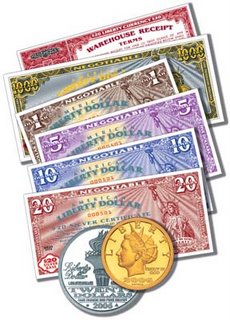Our federal daddy For o

ver 125 years, the American people elected a president. During that time, the powers of the president was extremely limited. The American people did not permit the passage, for example, of income taxation laws, drug laws, immigration laws, and welfare laws. They also refused to permit a large standing military force. And they did not allow their government to engage in foreign wars. Thus, when our ancestors went to the polls every four years, they knew that regardless of whoever was elected, the president would have extremely limited powers over their lives and fortunes.
But for the last several decades, Americans have elected much more than a president. They have, simultaneously, elected a daddy--
a federal daddy. Thus, modern-day Americans have a larger stake in presidential elections. For a presidential daddy is a much more important position than simply that of a president.
Our ancestors believed that a person should be free to take actions what others considered were harmful toward himself. As long as a person's conduct did not entail violence, fraud, or some type of direct interference against someone else's life, liberty, or property, the job of the president (and other governmental officials) was to protect the exercise of the conduct. Sometimes the choices made were unpopular or despicable. But the American people believed that what mattered was the right to choose. Thus, they refused to permit the passage, for example, of drug, censorship, and gambling laws.
20th (and 21st) century Americans took an opposite view. They did not want freedom of choice because they did not trust themselves or their fellow citizens with it. Thus, Americans empowered their daddy (and other government officials) to punish other adult citizens for doing bad things to themselves. "Johnny--Bad! Bad! You know you're not supposed to be putting bad things into your mouth!" And Johnny is a 40-year-old CEO. "Billy--Bad! Bad! You know you're not supposed to be looking at naughty pictures!" And Billy is a 55-year-old lawyer. "Mary--Bad! Bad! You know you're not supposed to be losing your money at poker!" And Mary is a 60-year-old doctor.
The principle is the same with welfare laws. Our ancestors believed that a person should be free to do whatever he wants with his own money. Thus, past Americans rejected Social Security, Medicare, public schools, subsidies, and other laws which took money from some to give to others. The idea was that a grown-up would decide for himself how to dispose with his own money. Private charities would provide for someone in need.
Modern-day Americans moved in an opposite direction. They said, "We cannot be trusted with freedom because we might not make the right decisions. We need a daddy to take control of our money and to force us to be good and responsible."
Thus, the welfare state was adopted in the United States in the 1930s. It is a way of life in which our elected daddy has control over our earnings; kind of like our allowance set by our daddy.
Moreover, no longer do American grown-ups have responsibility for deciding what to do with their incomes. For our daddy has been given control over these decisions. For example, American adults might not take care of the disadvantaged, so our daddy gives a portion of our allowances to the poor and needy. And if we are caught lying to our daddy about how much money we make each year, he said to us, "Bad! Bad! Go to your room for a few years!"
Our daddy also relieved us of the responsibility of choosing our friends. For he tells us whom to like and whom to dislike. For example, daddy tells us we should dislike Fidel Castro. Of course, we have a difficult time understanding why we should dislike him. After all, Fidel's policies are the same as daddy's: public housing and medial care for the poor and elderly, public schooling for everyone, forced retirement for everyone, and high taxation (Now, Cuba is more communistic than the USA, but that is measured in degrees--however, the policies are the same). But daddy says we should dislike Fidel, and that's good enough for us. Daddy knows best.
Of course, we are still wondering about Saddam Hussein. In the 80s, daddy gave lots of our allowance money to Saddam to help him out, and to furnish him with WMDs. Some of us wondered about supporting a man who had engaged in terribly bad conduct towards others. But we don't question daddy. Daddy knows best.
One day, daddy got upset at Saddam. And he said to us, "Saddam and I are no longer friends. I hate him. He's an 'Adolf Hitler' (never a 'Joseph Stalin'; although Stalin killed 4 times as many innocent victims as Hitler, 'Uncle Joe' was a close friend of America's first presidential daddy, Franklin D. Roosevelt). We cannot survive if Saddam continues to be president of Iraq."
So, we lost another friend. We immediately began hating Saddam. Saddam had to go. Our survival depended on it, as daddy said. Daddy knows best.
But Saddam didn't go! He stayed for over 10 years. We killed 200,000 of his citizens (what better way to punish a ruler than to kill some of his taxpayers). But Saddam stayed. And what does our daddy say about this? Well, it turns out that we can live with Saddam after all. Apparently, our survival does not depend on ousting him from office. Daddy knows best.
10 years later, daddy announced, "We will invade Iraq!" Iraq never attacked the USA, and even threatened to attack. That makes America the aggressor. Daddy said Saddam had WMD (from the USA), but there is no weapons found. Daddy said there is a link between Saddam and al-Qaeda, but there is no link found (by the way, where is Osama bin Laden and al-Qaeda anyway?; our daddy doesn't care about the only REAL threat against our country). And 9 months later, we captured Saddam! But, the war keeps going. And we keep on fighting, and dying--for nothing. We do it only because daddy wants us to. Daddy knows best.
The United States is a nation of children. American grown-ups view themselves and their relationship to their government in the same way they viewed their lives in public schools: they are little kids who depend on the principal to guide them, make their decisions for them, make them good, punish then when they are bad, and follow instructions. They are expected to do as they are told and never question the principal.
And we are a nation of people who now have been on the welfare-state dole for 7 decades (2-3 generations). The weakness of the American child-adult is best exemplified by the reaction to the idea of dismantling our welfare: "how would be survive without our dole--our welfare, Social Security, subsidies, public schools, SBA loans, and protect us from overseas competition?"
The same attitude holds true in foreign affairs. "How would we survive without our warfare empire? We need our daddy to protect our overseas interests and to decide who our foreign friends should be. You don't expect us to do it alone, do you?"
Modern-day Americans have exchanged the liberty won by our ancestors for the apparent security of America's welfare-warfare empire. But security does not come from empire, and empires ultimately crumble. A nation of weak, childlike grown-ups is a nation headed toward suicide. And talk of "getting tough overseas" and maintaining "military superiority" is false bravado. The crushing taxation, regulation, and control that comes with empires--and a lack of will to fight by weak, infantile adults--ultimately makes empires ripe for the plucking.
What would be the results if we ended America's welfare-warfare empire? The same results freedom brought to America for over 125 years. First, a nation of strong, responsible, and caring adults. Second, a strong and prosperous economic base that would provide the long-term security defense needed for military defense. Third, freedom would bring fierce fighters--citizen-soldiers, men and women alike--who would have the incentive, on a moment's notice, to take up arms to protect their own freedom, as well as that of their families and friends.
The solution for America is to retake the paradigm of freedom and limited government of our ancestors. We need once again to elect a president--not a daddy.









